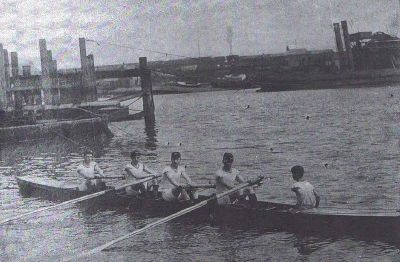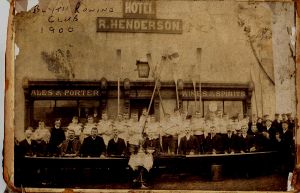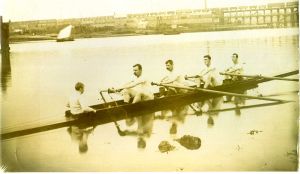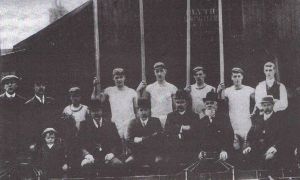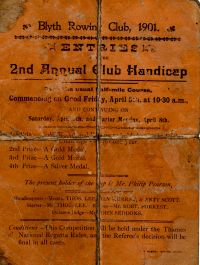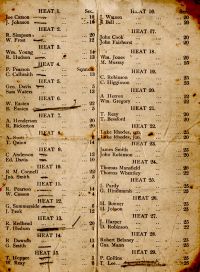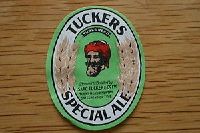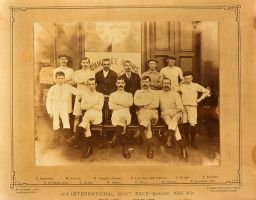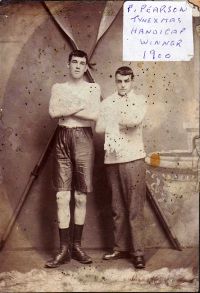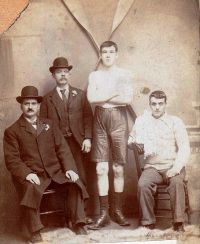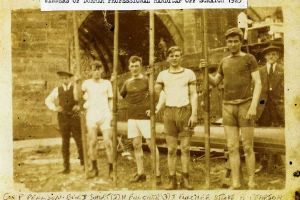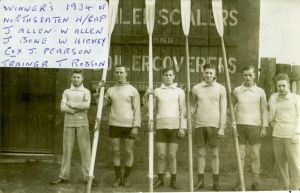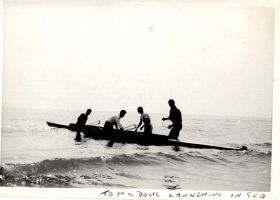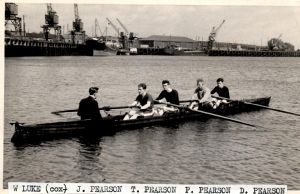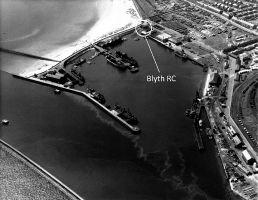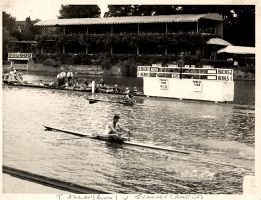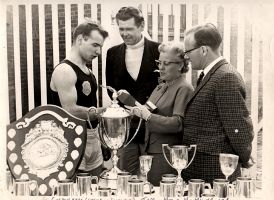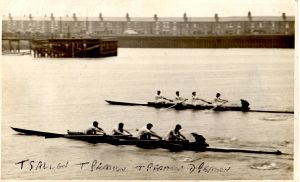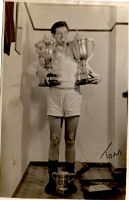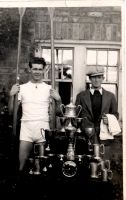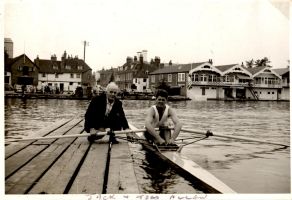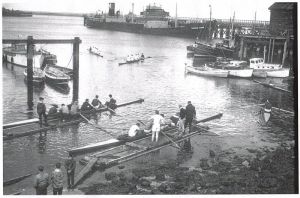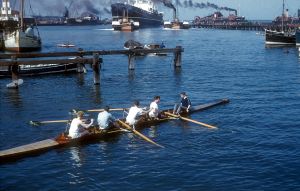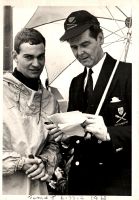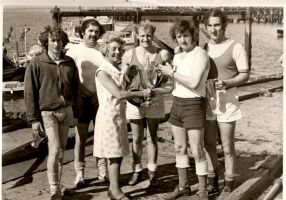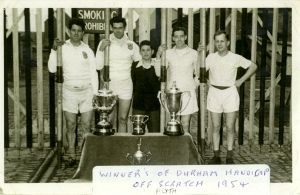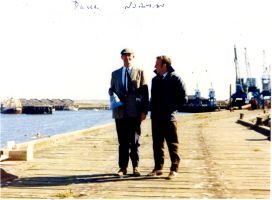Difference between revisions of "Blyth Rowing Club"
(Alan Fryer acknowledgement added) |
|||
| (18 intermediate revisions by the same user not shown) | |||
| Line 1: | Line 1: | ||
''Acknowledgement is given to Philip Pearson, Douglas Pearson, Alan Fryer and Ian Whitehead for contributions to this page''<br> | ''Acknowledgement is given to Philip Pearson, Douglas Pearson, Alan Fryer and Ian Whitehead for contributions to this page''<br> | ||
<br> | <br> | ||
== | == Early rowing and professional days == | ||
[[Blyth Rowing Club]] was a | By 1864 rowing had been established on the Blyth in emulation of the Tyne activities, no doubt aided by the dredging and development of the river in the previous decade. There were a large number of keelmen and wherrymen that were employed on the river, and rowing regattas were popular. The Golden Fleece Inn promoted races prior to the formation of [[Blyth Rowing Club|Blyth RC]], but these were professional races for large sums of money where the individuals were usually sponsored by drinking establishments. It was not until decades later that clubs were formed and in fact it was not until 1899 that [[Blyth Rowing Club]] was founded. Rowing became popular among most groups of working men, especially miners, but the sport also attracted the interest of all sections of Blyth society from Lord Ridley downwards.<br> | ||
<br> | |||
The Regatta of 1864 featured twelve races in total. Thirty-six boats were entered in a diverse mix of keel, coble, sculler, four-oared boats and sailing boats. The latter turned out to be a slow and ponderous affair due to there being only the lightest breeze. The regatta was organised in connection with the Bebside and Sleekburn collieries and the Bedlington Iron Works. The location of these works is no doubt in part to do with the location of the race being from the "Straight Quay", near the railway bridge, to the Cowpen Style" some 3/4 of a mile downriver. | |||
[[File:BlythOldCrew.jpg|left|400px|An early Blyth crew]] | |||
The following year, a committee had been formed to organise the regatta and no connection to any works, as in the previous year, was mentioned. In fact, the regatta was headed by Commodore and Judge R.Bell esq. The Commodore had a barge anchored on the river from where the Cowpen Colliery Band entertained the crowd. The barge acted as the starting point for the races. Large crowds attended, encouraged by the fine weather. The main interest of the day was in the skiff handicap consisting of three heats and a final, with three boats in each heat. Michael Blakey won the first prize of £7.00 (roughly £800).<br> | |||
<br> | |||
'''11th September 1866:''' Whitby Boat Race - Four Blyth miners travelled to Whitby to race in cobles against a local crew of fishermen. It was for a stake of £20 (roughly £2200). They were well beaten, but admired for the fight they put up. It was a huge event in Whitby with crowds accompanying the winners at a victory parade.<br> | |||
<br> | |||
== Club Formation == | |||
[[Blyth Rowing Club]] was formed in 1899 and closed in 1985 due to a declining membership. On the 16th September 1899, a meeting was held at Thomas Quinn's at Cowpen Square to discuss the formation of a rowing club, which opened later that year. The Club was originally based at the Golden Fleece Inn at Cowpen Square and then later, with the support of the Blyth Harbour Commission, in South Harbour, Blyth, Northumberland. Other clubs on the river were based at the [[North Blyth Rowing Club|Seven Stars Inn (North Blyth RC)]], Battleship wharf ([[Cambois Rowing Club|Cambois RC]]) and at Bates Pit. Bates Pit closed in 1986 & the site was cleared in 2000. [[Blyth Rowing Club|Blyth]] and [[Cambois Rowing Club|Cambois]] crews would row on a high tide up to Humford Woods, approximately three miles from the harbour mouth. It is also possible to row almost to the General Havelock Inn via the Sleekburn, a tributary of the River Blyth. The Golden Fleece Inn has now been demolished but was adjacent to the western High Ferry landing. <br> | |||
<br> | <br> | ||
<gallery widths=300px heights=200px> | <gallery widths=300px heights=200px> | ||
File:BlythRCGoldenFleececirca1900.jpg|''The original Golden Fleece boathouse 1900'' | File:BlythRCGoldenFleececirca1900.jpg|''The original Golden Fleece boathouse 1900'' | ||
File:BlythInternationalCrew1901or1903inclPhilipPearsonandDavies.jpg|''Blyth RC International crew 1901'' | File:BlythInternationalCrew1901or1903inclPhilipPearsonandDavies.jpg|''Blyth RC International crew 1901'' | ||
File:BlythRCNewClub.jpg|''Early Club Photo'' | |||
</gallery> | </gallery> | ||
<br> | <br> | ||
The second Blyth Handicap races were held in 1901 and [[Philip Pearson]] is listed as going off the scratch mark. Here is the programme for the event:<br> | The second Blyth Handicap races were held in 1901 and [[Philip Pearson]] is listed as going off the scratch mark. Here is the programme for the event:<br> | ||
| Line 15: | Line 24: | ||
File:Blyth1901HandicapProgrammeA.jpg|''Blyth Handicap Race programme 1901'' | File:Blyth1901HandicapProgrammeA.jpg|''Blyth Handicap Race programme 1901'' | ||
File:Blyth1901HandicapProgrammeB.jpg|''Blyth Handicap Race programme 1901'' | File:Blyth1901HandicapProgrammeB.jpg|''Blyth Handicap Race programme 1901'' | ||
</gallery> | </gallery><br> | ||
[[File:BlythTuckersBrewery.jpg|left|200px|Tucker Brewery]] In 1903 The 4th annual open-boat handicap for the Isaac Tucker Cup was held over the Easter weekend. Thirty-two competitors entered in total. The course of the race was from the boathouse to the Shearlegs. The sponsor, Isaac Tucker and Co., Turks Head Brewery, was established at Gateshead in 1790. They had fifty tied public houses at their commercial height. The cup in this year was won by G. Davis.<br> | |||
<br><br> | |||
<br> | |||
The clubs at the Bates Pit and the Golden Fleece Inn amalgamated in 1906, still located at the inn and rowing continued from there until 1926. The Club then moved to premises on Beach Road during the Great War, but only remained there for a few years. Larger premises were required and in 1932 the Blyth Harbour Commissioners arranged premises in the South Harbour and these, with alterations, were still used until 1985.<br> | |||
<br> | |||
== England v Scotland International Race == | == England v Scotland International Race == | ||
The International Race held on the River Blyth was between Glasgow and Blyth crews in June 1903. The race was sponsored by Arthur Jefferson, father of the famous actor Stan Laurel. Mr. Jefferson was the lessee of the Theatre Royal, Blyth as well as a theatre in Glasgow. He presented a trophy and five medals to the winning crew of [[Philip Pearson|P. Pearson]], B. Easton, W. Haines and G. Davis and E. Davison (cox). The race proved to be a tremendous attraction with many thousands lining the one-and-a-half mile course. A few weeks later a return match was held on the Clyde and this time it was the Scotsmen who won. T. Hudson had substituted for B. Easton in this race and the Blyth crew's expenses were covered by Arthur Jefferson. | The International Race held on the River Blyth was between Glasgow and Blyth crews in June 1903. The race was sponsored by Arthur Jefferson, father of the famous actor Stan Laurel. Mr. Jefferson was the lessee of the Theatre Royal, Blyth as well as a theatre in Glasgow. He presented a trophy and five medals to the winning crew of [[Philip Pearson|P. Pearson]], B. Easton, W. Haines and G. Davis and E. Davison (cox). The race proved to be a tremendous attraction with many thousands lining the one-and-a-half mile course. A few weeks later a return match was held on the Clyde and this time it was the Scotsmen who won. T. Hudson had substituted for B. Easton in this race and the Blyth crew's expenses were covered by Arthur Jefferson. | ||
| Line 31: | Line 47: | ||
Throughout its history, the Blyth Club placed great emphasis on competitive rowing and had a good record at open regattas. Until 1935 one of the main events in the rowing calendar was the [[Newcastle Handicap|Tyne Christmas Boat Handicap]]. This event started in 1876 and was last held in 1935, attracting scullers from all over the world. The event lasted a week and the winner had to be someone very special. The Blyth Club had three winners, [[Philip Pearson]] in 1900, James 'Curly' Lavery in 1909 and G. Lewis in 1913 - all outstanding scullers at the top of their game. James Lavery lived at Hodgson's Mill at Cowpen Square and beat Jack Dodds of Hexham in the 1909 final, having a 3 second start and winning by half a length. With his winnings he bought himself a new skiff which he named 'Lily'<br> | Throughout its history, the Blyth Club placed great emphasis on competitive rowing and had a good record at open regattas. Until 1935 one of the main events in the rowing calendar was the [[Newcastle Handicap|Tyne Christmas Boat Handicap]]. This event started in 1876 and was last held in 1935, attracting scullers from all over the world. The event lasted a week and the winner had to be someone very special. The Blyth Club had three winners, [[Philip Pearson]] in 1900, James 'Curly' Lavery in 1909 and G. Lewis in 1913 - all outstanding scullers at the top of their game. James Lavery lived at Hodgson's Mill at Cowpen Square and beat Jack Dodds of Hexham in the 1909 final, having a 3 second start and winning by half a length. With his winnings he bought himself a new skiff which he named 'Lily'<br> | ||
<br> | <br> | ||
'''1st June 1909:'''<br> | |||
On this day the rowing club christened a new four-oared boat built by Messrs. Brown of Durham was named "Robert Colledge". The boat had been donated anonymously by a "lover of aquatics". It was launched as part of a town-wide event and procession which also raised money for the lifeboat and local hospital. | |||
== 1920/30s == | == 1920/30s == | ||
In the 1920/30's the Club had an excellent period in 4-oared rowing and a Blyth crew invariably held the scratch mark in the area. Notable members were Jack Allen, Robert (Bob) Pearson, Jimmy Bell, Jack Fulcher, Walter Allen, Billy Hickey and [[Philip Pearson|Philip (Pip) Pearson]].<br> | In the 1920/30's the Club had an excellent period in 4-oared rowing and a Blyth crew invariably held the scratch mark in the area. Notable members were Jack Allen, Robert (Bob) Pearson, Jimmy Bell, Jack Fulcher, Walter Allen, Billy Hickey and [[Philip Pearson|Philip (Pip) Pearson]].<br> | ||
| Line 38: | Line 55: | ||
File:Blyth1934NSeatonHandicap.jpg|''Winners North Seaton Handicap 1934'' | File:Blyth1934NSeatonHandicap.jpg|''Winners North Seaton Handicap 1934'' | ||
</gallery> | </gallery> | ||
The austerity of the 1920s and 30s also played a part in the demise of the period. Ian Wrigglesworth in his book ''The Social History of English Rowing'' comments that the 1926 General Strike "endangered the very existence of some Northern clubs such as those at Blyth and Cambois". Members of the club had been excused subscriptions until the strike ended but the lack of income must have had a detrimental effect on the club's viability. Clubs throughout the country, especially works-based clubs, had folded during the depression of the 1930s. | |||
== World War II and post-war era == | == World War II and post-war era == | ||
There was a temporary eviction during the 1939/45 war when the premises were required by the Royal Navy, and occupied as part of Mine Sweeping & Motor Gun Boat facilities; the dock area was strictly out of bounds. Rowing ceased for 6 years and the boats were stored at West Blyth.<br> | There was a temporary eviction during the 1939/45 war when the premises were required by the Royal Navy, and occupied as part of Mine Sweeping & Motor Gun Boat facilities; the dock area was strictly out of bounds. Rowing ceased for 6 years and the boats were stored at West Blyth.<br> | ||
Latest revision as of 15:36, 21 February 2022
Acknowledgement is given to Philip Pearson, Douglas Pearson, Alan Fryer and Ian Whitehead for contributions to this page
Early rowing and professional days
By 1864 rowing had been established on the Blyth in emulation of the Tyne activities, no doubt aided by the dredging and development of the river in the previous decade. There were a large number of keelmen and wherrymen that were employed on the river, and rowing regattas were popular. The Golden Fleece Inn promoted races prior to the formation of Blyth RC, but these were professional races for large sums of money where the individuals were usually sponsored by drinking establishments. It was not until decades later that clubs were formed and in fact it was not until 1899 that Blyth Rowing Club was founded. Rowing became popular among most groups of working men, especially miners, but the sport also attracted the interest of all sections of Blyth society from Lord Ridley downwards.
The Regatta of 1864 featured twelve races in total. Thirty-six boats were entered in a diverse mix of keel, coble, sculler, four-oared boats and sailing boats. The latter turned out to be a slow and ponderous affair due to there being only the lightest breeze. The regatta was organised in connection with the Bebside and Sleekburn collieries and the Bedlington Iron Works. The location of these works is no doubt in part to do with the location of the race being from the "Straight Quay", near the railway bridge, to the Cowpen Style" some 3/4 of a mile downriver.
The following year, a committee had been formed to organise the regatta and no connection to any works, as in the previous year, was mentioned. In fact, the regatta was headed by Commodore and Judge R.Bell esq. The Commodore had a barge anchored on the river from where the Cowpen Colliery Band entertained the crowd. The barge acted as the starting point for the races. Large crowds attended, encouraged by the fine weather. The main interest of the day was in the skiff handicap consisting of three heats and a final, with three boats in each heat. Michael Blakey won the first prize of £7.00 (roughly £800).
11th September 1866: Whitby Boat Race - Four Blyth miners travelled to Whitby to race in cobles against a local crew of fishermen. It was for a stake of £20 (roughly £2200). They were well beaten, but admired for the fight they put up. It was a huge event in Whitby with crowds accompanying the winners at a victory parade.
Club Formation
Blyth Rowing Club was formed in 1899 and closed in 1985 due to a declining membership. On the 16th September 1899, a meeting was held at Thomas Quinn's at Cowpen Square to discuss the formation of a rowing club, which opened later that year. The Club was originally based at the Golden Fleece Inn at Cowpen Square and then later, with the support of the Blyth Harbour Commission, in South Harbour, Blyth, Northumberland. Other clubs on the river were based at the Seven Stars Inn (North Blyth RC), Battleship wharf (Cambois RC) and at Bates Pit. Bates Pit closed in 1986 & the site was cleared in 2000. Blyth and Cambois crews would row on a high tide up to Humford Woods, approximately three miles from the harbour mouth. It is also possible to row almost to the General Havelock Inn via the Sleekburn, a tributary of the River Blyth. The Golden Fleece Inn has now been demolished but was adjacent to the western High Ferry landing.
The second Blyth Handicap races were held in 1901 and Philip Pearson is listed as going off the scratch mark. Here is the programme for the event:
In 1903 The 4th annual open-boat handicap for the Isaac Tucker Cup was held over the Easter weekend. Thirty-two competitors entered in total. The course of the race was from the boathouse to the Shearlegs. The sponsor, Isaac Tucker and Co., Turks Head Brewery, was established at Gateshead in 1790. They had fifty tied public houses at their commercial height. The cup in this year was won by G. Davis.
The clubs at the Bates Pit and the Golden Fleece Inn amalgamated in 1906, still located at the inn and rowing continued from there until 1926. The Club then moved to premises on Beach Road during the Great War, but only remained there for a few years. Larger premises were required and in 1932 the Blyth Harbour Commissioners arranged premises in the South Harbour and these, with alterations, were still used until 1985.
England v Scotland International Race
The International Race held on the River Blyth was between Glasgow and Blyth crews in June 1903. The race was sponsored by Arthur Jefferson, father of the famous actor Stan Laurel. Mr. Jefferson was the lessee of the Theatre Royal, Blyth as well as a theatre in Glasgow. He presented a trophy and five medals to the winning crew of P. Pearson, B. Easton, W. Haines and G. Davis and E. Davison (cox). The race proved to be a tremendous attraction with many thousands lining the one-and-a-half mile course. A few weeks later a return match was held on the Clyde and this time it was the Scotsmen who won. T. Hudson had substituted for B. Easton in this race and the Blyth crew's expenses were covered by Arthur Jefferson.
The above photograph is of the International crew from Blyth in 1903. Philip Pearson is pictured far right at the back, and another significant member is Thomas Lee (back row, fourth from left), who was instrumental in the founding of the club and held a long record within the club as coach and mentor.
Professional rowing and the sums involved were impressive. There were numerous Open Handicaps and Challenge Races for side stakes, but the promoters of the Tyne Christmas Sculling Handicap - won by Blyth’s Philip Pearson aged 19 - put up a prize of £100. In current terms (2020 AD), was worth £10,000! At 6 feet 3 inches, Philip would have been something of a giant compared to his competitors.
Throughout its history, the Blyth Club placed great emphasis on competitive rowing and had a good record at open regattas. Until 1935 one of the main events in the rowing calendar was the Tyne Christmas Boat Handicap. This event started in 1876 and was last held in 1935, attracting scullers from all over the world. The event lasted a week and the winner had to be someone very special. The Blyth Club had three winners, Philip Pearson in 1900, James 'Curly' Lavery in 1909 and G. Lewis in 1913 - all outstanding scullers at the top of their game. James Lavery lived at Hodgson's Mill at Cowpen Square and beat Jack Dodds of Hexham in the 1909 final, having a 3 second start and winning by half a length. With his winnings he bought himself a new skiff which he named 'Lily'
1st June 1909:
On this day the rowing club christened a new four-oared boat built by Messrs. Brown of Durham was named "Robert Colledge". The boat had been donated anonymously by a "lover of aquatics". It was launched as part of a town-wide event and procession which also raised money for the lifeboat and local hospital.
1920/30s
In the 1920/30's the Club had an excellent period in 4-oared rowing and a Blyth crew invariably held the scratch mark in the area. Notable members were Jack Allen, Robert (Bob) Pearson, Jimmy Bell, Jack Fulcher, Walter Allen, Billy Hickey and Philip (Pip) Pearson.
The austerity of the 1920s and 30s also played a part in the demise of the period. Ian Wrigglesworth in his book The Social History of English Rowing comments that the 1926 General Strike "endangered the very existence of some Northern clubs such as those at Blyth and Cambois". Members of the club had been excused subscriptions until the strike ended but the lack of income must have had a detrimental effect on the club's viability. Clubs throughout the country, especially works-based clubs, had folded during the depression of the 1930s.
World War II and post-war era
There was a temporary eviction during the 1939/45 war when the premises were required by the Royal Navy, and occupied as part of Mine Sweeping & Motor Gun Boat facilities; the dock area was strictly out of bounds. Rowing ceased for 6 years and the boats were stored at West Blyth.
After the cessation of hostilities, surviving members of the Rowing Club returned home from early 1946 onwards but could not resume rowing as the Royal Navy had not vacated their premises. Blyth Harbour Commission arranged temporary premises on the German Jetty, immediately west of the Royal Northumberland Yacht Club moorings, which had been previously occupied by Sea rangers, but within a couple of years the Club was back home in its own premises and remained there until its closure.
It is worth mentioning the Club’s closure during the 1939/45 war. At the outbreak, the majority of members prepared to 'go to War', but still had a care for the future of the club. The club was closed and the boats put into storage. Naturally, the club finances had to be considered and these were deposited in an account in favour of the youngest member, a boy coxswain - Tom Pearson. As it happened, hostilities lasted long enough for Tom Pearson to join the Royal Navy, aged seventeen. Fortunately, he survived and returned to join the other surviving members to restart the Club in 1946.
After the 1939/45 war, professional rowing had lost its popularity, whereas amateur rowing boomed and the rowing club considered it advisable to apply for a change in status to that of an amateur club. Amateur status was granted to the Club in 1948 and proved an asset. More events were available to the members and they could now be considered for representative honours with County and Country. During the period from here to mid-1960’s, two physically strong and technically brilliant scullers & oarsmen appeared to highlight what working class men could do. They were Tommy Allen & Tom Pearson.
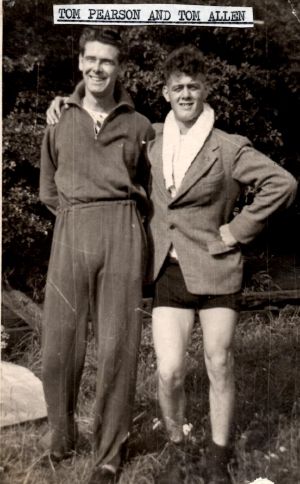 Tom Pearson and Tom Allen
Tom Pearson and Tom Allen
Successes continued after the war, in particular with Tommy Allen and Tom Pearson. Usually members specialise in sculling or sweep-oar rowing, but these two members were experts at both. As members of the Blyth first crew, they won numerous events, notably the Head of River Tyne Clinker Fours division in 1954 and 1955 and the last handicap held at Durham Regatta “Off the Scratch Mark”.
Probably their most notable success together was at the 31 mile Boston marathon, when they won the double sculls event in 1963. To indicate their speed as scullers, after 20 miles they were 7 minutes faster than the eventual winning eight. Unfortunately, with going faster than officials predicted, they missed a refreshment point and deteriorated with eight miles to go from a lack of food and water.
It is impossible to decide whether or not Tommy Allen or Tom Pearson in the 1950’s would have beaten Curley, Lavery or Philip Pearson in the early 1900’s but records show that as far as sculling is concerned Tommy Allen won more events that any other Blyth member. Plus, Tommy entered the Henley Diamond Sculls only to be matched against a Russian Olympian in the first round losing by 2 feet.
The two families of the Allens and Pearsons continually figured in the club records. Philip Pearson was a very successful sculler and oarsman in the early 1900’s, his sons Robert (Bob), Philip (Pip), Jim, Douglas and Tom had numerous successes from 1928 to 1963 and his grandson was successful in the mid 1970’s. Cornelius Allen was a very successful sculler and oarsman in the early 1900’s, his sons Jack, Walter and Septimus were successful in the 1930’s and his grandson was very successful from 1950 to 1963.
In 1959, Blyth Running Club who often visited the boathouse after training for tea, received a challenge from the Pearson Brothers to a race from the boathouse to Seaton Sluice and back; known as the "Blyth Beach Race". Many famous names have competed such as Jim Alder, Mike McLeod and the race continues to this day.
1960s and beyond
In the late 1960’s another Blyth Sculler took over the mantle of top sculler in the area. John Liddle had a phenomenal success for a few years and then decided that yachting gave him more enjoyment. The 1970’s was not a particularly successful period for the Club but another sculler came to the fore for a short period. Philip Pearson (son of Jim Pearson) had two exceptional years in 1975 and 1976 but moved out of the area.
Ten members of the club have been chosen to represent the County of Northumberland and were awarded County Caps. The most successful was Tom Pearson who represented the County on four separate seasons.
Final days of the Club
Tom, Doug and Jimmy Pearson carried on rowing well into their eighties, eventually moving to Cambois Rowing Club when Blyth folded. They were all absolute gentlemen and great supporters of rowing generally and also very close; in fact Tom and Doug passed away within minutes of each other in Wansbeck Hospital; together in life and together in death.
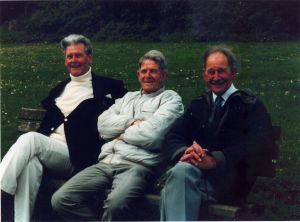 Tom, Doug and Jim Pearson
Tom, Doug and Jim Pearson
A great feature of the Pearson Brothers from the BBC Look North, albeit after they moved to Cambois after the closure of Blyth RC.
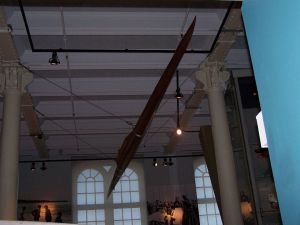 Professional sculling boat for 9 stone sculler
Professional sculling boat for 9 stone sculler
An interesting exhibit exists in the Tyne & Wear Museums. An extremely fragile and lightweight boat (for a 9 stone sculler) named the J.A. Hutchinson, was used in professional racing and was originally at Tyne United Rowing Club, but moved to Blyth RC upon their closure in the 1960s. Boats on the river Tyne were often named after a patron who had paid for it to be built. This boat was probably named after James Arthur Hutchinson, Mayor of Gateshead in 1951, a printer by trade who had lost a leg in the First World War, and then later had his other leg amputated. The boat was bought by Tom McParlin from a Ken Shanks in probably in the late 1950s. The agreed price was 6d and a receipt exists for this. Tom rowed on the Tyne for the Tyne United Rowing Club. The scull had been built for a 9 stone sculler and that would tally with the very fine lines – it would not have sufficient buoyancy to support a bigger man.
Tom was in the boat on the Tyne during a Tyne v Thames race during the 1960s. He was in the built up area of the river around the bridges when he began to sink. He got over to the Gateshead side of the river and, hanging on to the timber fenders on the wall, he got out of the boat while clinging on to it; not easy with the tide running, and he would be lucky to catch it at slack water. The river police came over and despite his protests, they snagged the boat with a boat hook, damaging it in the process. It went back to Tyne United Rowing Club, but was not repaired and was never used again.
When the Tyne United Club closed, the boat was taken to Blyth Rowing Club. Then when the Blyth Rowing Club closed in the 1980s, Doug Pearson, acting on behalf of the Club, donated the scull to Tyne and Wear Museums on 29th May 1986.
Newspaper & press items
8th May 1874
The Sporting Intelligence reported:
BOAT RACE AT BLYTH FOR £100.- On Saturday afternoon, a skiff race, in best and best boats, took place upon the river Blyth between Joshua Rawling, of Bebside, and William Williamson, of Cowpen Quay, from the Flanker to Cowpen Quay for a stake of £5 a-side, according to the Thames National Regatta Rules, and resulted in favour of Williamson. Both men underwent the most careful training for the race, which to a large extent, settles the supremacy of the Blyth rowing talent.
25th August 1892
The Shields Daily Gazette reported:
Yesterday afternoon the annual sports in connection with the Blyth Amateur Swimming Club were brought off in the River in the presence of a large number of spectators who thronged the piers and along the beach. The usual flotilla of boats were upon the river. The programme consisted of eleven events, and some rare good sport was witnessed. Open Sailing Race: J. Hogg's 'Little Lizzy',1; W. Gibbs 'Sally', 2; and N. Fulton's 'Enelid,'; 3. This race was the cause of much attention. Sculling race with one oar: Thos. Brown won after an exciting struggle. There was also a boat race with shovels, water polo, and a model yacht race, which events caused much attraction, and the sports passed off most successfully. Selections of music was given the band of the Division of the Tynemouth Artillery Volunteers, under the direction of J.R. Mason. Mr R. Detchon, of Newcastle, was starter for the swimming contests; Mr J. Richardson for the boat racing, whilst Messrs. Lee, Gray, Cowell and Ashwith acted referees.
16th September 1899
The Morpeth Herald reported:
NEW ROWING CLUB AT BLYTH - At a well attended meeting of gentlemen interested in aquatics, held at Thomas Quinn’s, Golden Fleece, Blyth, for the purpose of discussing a proposal establish a rowing club, Mr. Thomas Lee, of Cowpen Square, was voted to the chair. The Chairman, in opening the proceedings, commented on the apparent need for a rowing club at Blyth, where, he pointed out, the facilities were exceptionally good. A number of young men in the town had approached him to move in the matter, and in the event of the club being formed he had also received promised support from influential gentlemen. Mr. Wm. Carson supported the object of the meeting, and stated that he bad been authorised to put forward the names of several promising scullers. Mr. T. Quinn mentioned that every assistance would be offered to the club by Mr. R Simpson. (Applause.) Mr. George Elliot moved, and Mr. W. Carson seconded a motion formally establish the club, and the motion was unanimously adopted. It was also resolved to call the organisation “the Blyth Rowing Club” Mr. T. Lee was elected secretary pro tem., and over 20 names were enrolled. The business of electing officers and adopting rules was left over to a meeting to be held on Monday night first, when also the question of purchasing a boathouse on the riverside will be considered.
14th November 1899
The Shields Daily News reported:
In the presence of a large gathering of patrons, the new house acquired by the Blyth Rowing Club, was opened Saturday afternoon by Richard Nicholson, President of the club, who, in the course of a pithy speech, mentioned the fact that already a membership of over 50 was on the books. The house, he said, boasted exceptional facilities and accommodation for carrying out the intentions of the club. There was room for a large number of boats. At present the club was in possession of four boats, two of which had been christened the "Isaac Tucker" and "Dr Newstead" respectively. After the ceremony a boat race was rowed between two members of the club, Messrs Anty Scott, of Blyth, and Robert Thompson, of North Seaton. The course was over quarter of a mile for £10. The river was scarcely as smooth as the proverbial duckpond, a fresh breeze causing a nasty ripple. The North Seaton man got away fast at the commencement, and held the lead for the first hundred yards, but Scott then got on terms, and eventually won a good race by two clear lengths. Sunday morning, another member of the club, Mr Luke Rhodes, whilst taking practice in one of the club boats, came into collision with a jetty, and upset his craft. He managed to get hold of one of the cross beams of the jetty, and held on till he was rescued from the shore.
22nd March 1901
The Blyth News reported:
Thomas Lee, the Secretary to the Blyth Rowing Club, has received £2 as a preliminary deposit to ratify a match between George Summerside and Wm. Frost, of Blyth RC, who agree to scull in open boats over the half-mile course on the Blyth for £20. Frost will receive 10 seconds start and the date of the match is fixed for April 20th. A further deposit will be made at the Golden Fleece Inn at Cowpen Square on Saturday Night first. The members of the Blyth Club have just added two handsome new open boats built to the order of the club by Messrs Brewer and Swaddle, of London and two four-oared boats purchased from Mr. Nelson's Low Elswick establishment. The boats are 22 feet in length and 19 inches beam. They will be christened on Saturday first in the usual manner, after which a couple of members will try their merits over a half-mile, the winner to receive a gold modal kindly offered for the purpose by a local gentleman. The clubhouse now contains six open boats, two fours and and a skiff, all the property of the members.
9th May 1902
The Blyth News reported:
The Isaac Tucker Cup. Those interested in aquatics, and they are a growing quantity in the Blyth district, will have another opportunity furnished them tomorrow of reckoning up the merits of the Blyth Rowing Club, who hold their annual confined handicap for possession of the Isaac Tucker Challenge Cup, at present held by T. Hudson. 26 scullers will compete and medals will also be presented to the winner and those who come highest up.
26th August 1905
The Morpeth Herald reported:
An interesting ceremony took place at the Theatre Royal, Blyth, when, during the interval, Mr. Fred. Ferry, representing Isaac Tucker and Co., Gateshead, presented the Tucker Cup and prizes to the successful rowers. The prize-winners A. Uddgreen (cup winner), J. Charlton 2, 11. Nicholson 3, A. Henderson 4. Mr. Thomas Lee and a number of supporters of the club were present the stage. Mr. Fred. Ferry, of Gateshead, in handing over the Cup, said that he had been honoured in being asked make the presentation. He then gave a brief outline of the club's history, and said it was inaugurated in 1899, and the Isaac Tucker Challenge Cup was rowed for the following year, when it was won by Phillip Pearson. (Applause.) Thomas Hudson won in 1901, John Tate in 1902, Geo. Davis in 1903, C. Allan in 1904, and this last year by Mr. Uddgreen. (Applause.) Mr. Ferry went on to point out that in 1900 Mr. Pearson won the Tyne Christmas Boat Handicap, and three years later A. Bushell succeeded in rowing a good second. At the various regattas the club had always done well, and could claim to the best single sculler and the beat four-oared crew in the North of England. (Applause.) That was a record of which the townspeople should be proud, and he hoped that they would all give the club all the encouragement they possibly could. Mr. Ferry further pointed out that the sport of rowing ranked first as far as muscle exercise was concerned, not only one, but every muscle of the body was developed. He then handed the cup and gold medal over the care of Mr. Uddgreen, promising that the club could be assured the support of his firm. — Mr. Uddgreen briefly returned thanks. An amusing incident occurred when Mr. Thos. Lee came forward to thank Messrs. Tucker and other supporters of the club. The curtain by some accident fell, and Mr. Lee's speech remained undelivered.
9th December 1905
The Morpeth Herald reported on a struggling financial situation:
Mr. Thomas Lee, Secretary of the Blyth Rowing Club, at the meeting on Friday evening, presented the annual balance sheet, which showed an income of £11 3s, and expenditure of £6 16s 4d, leaving a balance of 6s Bd. After discharging loans this balance will be exhausted.
23rd June 1906
The Morpeth Herald reported:
The members of the Blyth Rowing mustered strong Monday evening at the headquarters the club, Golden Fleece, Cowpen Quay, where the Tucker Cup and medals were presented. The Chair was occupied by Mr. A.W.W. Wood, Gateshead. The toast The King and Royal Family was loyally received, after which Mr. Wood referred to the art of rowing, which was an exercise worthy an Englishman. It was one which had for him peculiar attraction, for he himself had been an oarsman and prize-winner. He was keen to have seen such excellent rowers they had in connection with that club. Thev are men of admirable physique: he had not seen better anywhere, and he had been a rower for 22 years. (Applause.) He was glad to be in any way associated with the Blyth Rowing Club, for it had an admirable record. Formed in 1899, they had started with some good material, for they were the winners of money prizes, and also of the Christmas Handicap in 1900 and of the Chancellor's Plate at Durham in 1901. In 1902 they won a £25 handicap and the professional four-oared race the same year, and further they rowed first and second for the Chancellor's Plate in that year, and also won the Southwick Regatta - a wonderful performance. In 1903 they won the Chancellor's Plate at Durham again and took second prize in the Christmas Handicap. That was a record which any club should be proud of, and he had doubt that the young at the club would resolutely strive to emulate the part performances of their older members, and would maintain if not excel the performances he had indicated. (Applause) Presenting the Tucker Cup to Mr James Charlton, the winner. Mr. Wood said his achievement was very creditable for a young man. On a previous occasion he had rowed second, and had evidently determined that he would improve his earlier effort and that he had triumphantly done. (Applause.) It was an example for the other unsuccessful rowers to copy. They could not all be winners, but they could put forward their best efforts. In handing over the Tucker Cup. he hoped that Mr. Charlton would achieve many more successes. With the cup was a gold medal as a souvenir of the occasion. Gold medals were also given to C. Allen. D. Lavery and C. Lavery. In proposing the club. Mr. Wood referred to the active and useful work done by the secretary, Mr. Thos. Lee. who had displayed great interest in the club and great judgment in the selection of men for competitions, and it was no small honour for him to have won competitions on the Blyth, Tyne, Wear, and even at Glasgow. (Applause.) Mr. T Lee and Mr. Pearson responded, the latter remarked that they had a four-oared crew prepared to row any in the country (Applause.) Other toasts followed, and the evening was spent in social harmonv.
3rd November 1921
The club must have been in dire straights in respect of activity (presumably because of the effects of the Great War) because in 1921 a meeting was held to attempt to revive the Club. The Blyth News reported: A meeting of those interested in the revival of the Rowing Club was held in the Quoits Ground, Cowpen Square, on Sunday morning. Mr Alex Mather was appointed pro tem. A further meeting will held at the same place next Sunday morning, when it is expected that the number of members who handed in their names last Sunday will be considerably augmented.
22nd May 1924
The Blyth News reported:
The Blyth Rowing Club is making satisfactory progress, and has just added four new boats - one double and three single scullers, to its equipment of craft. The new boats will be "christened" on Sunday week. the ceremony taking place at the Import Dock.
11th February 1937
The Blyth News reported: ...a soccer fixture between Blyth Rowing Club and Bedlington YMCA in the Blyth & District League, indicating the club was also able to produce a soccer team as well as perform waterborne activities.
10th May 1937
The Blyth News reported:
A club handicap is to be held by Blyth Rowing Club in the South Harbour on Coronation Day, the start being timed for 2.30. Ample facilities exist for spectators wishing to enjoy an afternoon of interesting aquatic sport.
18th May 1937
The Blyth News reported:
Blyth Rowing Club regatta in the South Harbour on Wednesday afternoon, provided interesting sport for members and their friends. After a number of close and exciting races W. Allen's crew beat J. Evan's crew and J. crew for the final honours. The winning crew was S. Menzies, D. Pearson, S. Stafford and W. Allen (stroke). It is proposed to hold a full professional handicap in the summer.
24th December 1941
Taken from the Blyth News, Ashington Post:
Tom Lee Recalls Great Rowers and Notable Races: Christmas Day Charity Match at Croft Park Anybody knowing the history of Blyth Rowing Club from the late part of the last century to about the last ten to fifteen years of the present century will also know Mr Tom Lee. On the other hand, what Tom himself does not know of the same history isn't worth knowing. If he had forgotten much of it he could be readily excused, seeing that he is now going on for 87 years of age. Actually, however. he retains a wonderful memory of details and he astonished me by the easy way he quoted dates, races, individual rowers and crews. More than that, Tom impressed me as a splendid type of veteran sportsman. One of Mr Lee's memories of 1903 was the performance of Tony Bushell in the Tyne Christmas Boat Handicap. In spite of having to give four seconds start in the final to J. Humphrey, Newcastle. and also having the heavier side of the course in consequence of the prevailing weather conditions, Tony finished a close runner-up. Turning again to the professional four-oared handicap at Durham Regatta. Tom well remembers their members winning the finals of 1909 and the following year and reaching the semi-final in 1905 and 1911. Tom was born at the Old Folly - now an extinct part of Blyth in June, 1855, and lived for 60 years at 11 Cowpen Square before removing to his present address, which, of course, is near by. When he finished work on reaching 72 years of age. he had done 60 years and three months as a miner and all under the Cowpen Coal Company. Throughout the years Tom was connected with the Rowing Club he kept an "ever-open door" for the members, who found this very handy because of his home in Cowpen Square being so near the river.
23rd September 1948
The Blyth News reported:
WON OWN REGATTA - North Seaton Rowing Club's regatta held on the River Wansbeck on Saturday and Sunday, was won by one of its own crews. stroked by G. Warnaby. They were off nine and in the final defeated Blyth (D. Pearson) off ten. Defeated semi-finalists were two Cambois crews, stroked by M. Turnbull (scratch) and T. Sharp (eight).
23rd May 1952
The Morpeth Herald reported:
FORMER STAKEFORD MAN STROKES WINNING CREW - North Seaton Rowing Club were defeated by four lengths by Tyne United in the final the Northern Amateur Rowing Trials on the River Tyne on Saturday. By this defeat North Seaton were deprived of the opportunity of representing the Tyne in a contest with a club, Barnes Amateur, in the London Clubs Regatta on 8th June. The contest will be held for the first time since the war. The Tyne club was stroked by a former Stakeford man, W. Kennedy, who was a member of the Cambois crew, stroked by Matt Turnbull, when they were winners of the Durham Handicap in 1947 and 1949. The North Seaton crew, which usually rows over a half-mile course, felt the strain of the course, between Scotswood Bridge and Newcastle Corporation Quay, which is over the mile. The North Seaton crew was stroked by R. Rees and other local clubs, Cambois and Blyth, competed.
